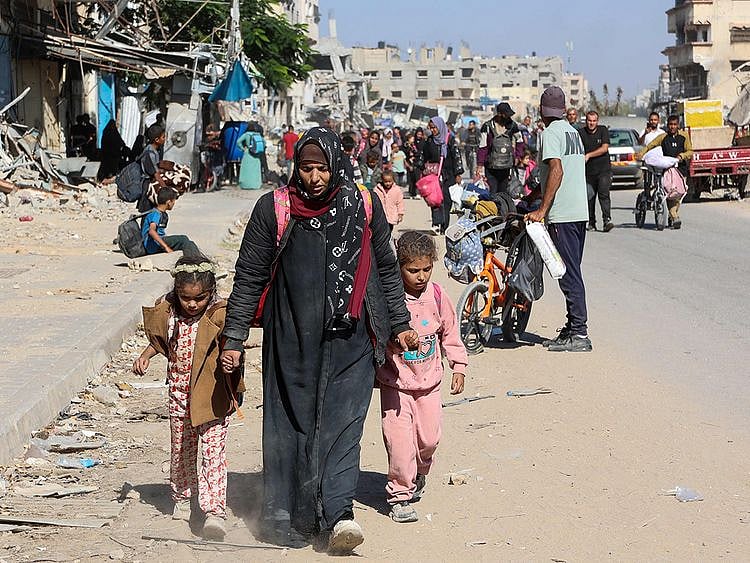Lost in the shuffle last week between the news of US President Trump’s plan to empty Gaza of Gazans and turn the enclave into a Cote d’Azur of the Eastern Mediterranean — a plan met globally with wide-eyed disbelief — and the prisoner-exchange between Hamas and Israel, is the news of the ongoing mayhem in the West Bank.
That mayhem was unleashed in late January by the Israeli military against civilians during a deadly offensive aimed at ethnically cleansing cities, towns, villages and in particular refugee camps in the northern regions of the occupied territory, a deadly offensive that “historians and researchers say is the biggest displacement of civilians in the territory since the Arab-Israeli war of 1967”, according to a news report in the New York Times on Monday. It has, as soldiers took over one area after another, destroyed homes, infrastructure and roads.
Plan in action
It is difficult to see this latest outrage as anything other than a transparent effort to fundamentally alter the political and demographic landscape of the occupied West Bank in advance of its annexation by Israel, a move that the permissive new administration in the White House may not altogether object to, given its declared support for the expansionist agenda embraced by Israel’s far-right, ultranationalist groups.
The offensive, masquerading as one mounted to hunt down members of the Palestinian resistance, continued the report, “has forced thousands of residents (in three northern parts of the West Bank) to shelter with friends and relatives, or camp in wedding halls, schools, mosques, municipal buildings and even farm sheds” — a situation that would have sounded all too familiar to Gazan families in the first few months of the Gaza war.
So far, a reported 40,000 Palestinians have been displaced — ironically most of them inhabitants of refugee camps in Jenin, Tulkarem and Tabus, folks for whom this displacement must evoke in their minds the trauma — inherited by their children — of the time they were driven out of their homes and ancestral land in 1948.
And in an effort to accelerate further the plan they started in 1967 (the year they drove 325,000 West Bankers across the River Jordan) to Judaise occupied East Jerusalem (the international community considers East Jerusalem, like the West Bank, of which it is a part, to be Palestinian territory under Israeli occupation), Israeli authorities have also in recent weeks cranked up their claims that between a third to a half of the city’s homes, owned for generations by Palestinians, “do not have permits”, placing well over 100,000 Jerusalemites at risk of forced eviction or at risk of seeing their homes demolished.
Palestinians did not bend
It was difficult to glean, as we watched Israelis running amok in the West Bank and Gaza in recent months, heaping cruelty upon cruelty on Palestinians, what lies behind the twisted intent of a people who abuse millions of other people in their quest to reinvent their identity as Israeli Jews in the modern world. But there you have it, an issue that should be left in the trust of qualified therapists to ponder.
Israeli leaders, and along with them a large segment of the Israeli public, have not yet learnt that however unspeakable the suffering they have inflicted on Palestinians may have been over the last three quarters of a century, it did not work. It just did not. The Palestinians did not bend. They did not go gentle into that good night, as it were.
These leaders, along with that segment of their public, have not learnt the stubborn truth that as Palestinians were impoverished, they were also enriched by their experience as an occupied people, a people who used whatever of that suffering they had endured as a whetstone on which to hone their skills at survival. Indeed, it was from that suffering that emerged their shared sense of belongingness to the land and their rich sense of identity as a people and a nation.
This stubborn truth was made universally evident by people everywhere who had fought — and readily died, like so many Nathan Hales — for the right of their nation to be free, independent and self-determining. Ask the Irish, the Vietnamese, the Algerians and others who struggled, propelled by their will-to meaning, against those who struggled, propelled by their will-to-power, to occupy, subjugate and reduce to a fragment the humanity of the other.
And, finally, these Israeli leaders, and along with them, I say, a large segment of the Israeli public, have not yet learnt that the Zionist dream of wiping Palestine off the map of the world and its people off the face of the Earth is not much nearer realisation today than it was more than a century ago — and is not likely to be realised at any time in the future.
Look, stronger than any 2,000-pound bomb is an idea whose time the world agrees has come — a time for the people of Palestine to live their lives as a free, independent, sovereign people in their own ancestral land, for this is a time in our history when the global dialogue of cultures is in anchored in the belief that no people should ever be denied, in the words of Hannah Arendt, the right to to have rights.
Fawaz Turki is a noted academic, journalist and author based in Washington DC. He is the author of The Disinherited: Journal of a Palestinian Exile.
Sign up for the Daily Briefing
Get the latest news and updates straight to your inbox
Network Links
GN StoreDownload our app
© Al Nisr Publishing LLC 2026. All rights reserved.
